The Career Page Crisis | #126
Why Stripe has the only good career page on the internet (okay maybe Costco too)
January 30th, 2021: Greetings from Taipei. It’s day 9 of our quarantine here in Taiwan. We were lucky enough to stay in Angie’s parents apartment so we’ve been able to walk in and out of different rooms to keep us occupied. Thank you to Arvind and Peter for becoming paid supporters of the newsletter and greetings to the 75 new subscribers, hitting the 3,500 subscriber mark.
This week’s picture features Angie’s rock painting creations a hobby she picked up only a few months ago. Crazy!
If you’re stumbling on this from the internet feel free to subscribe here:
#1 Stripe seems to be the only company that has put effort into its career page
This week I went through more than 100 career pages. It started because I have been writing about how our expectations of work have changed dramatically since I graduated in 2007. When I graduated careers pages were simply a listing of jobs available.
However, somewhere in the last 15 years, things started to change. Companies started to market working at their companies and use language like “find your calling” or “do the most important work of your life.” AirBnB’s page tells people that they can “live their best life” at AirBnB.
This is a big shift and has led to a vicious cycle of increasing expectations and bolder language around what the company claims to offer. This is great except I’m not sure that most companies can guarantee that people will live their best life or do the most meaningful work of their careers. Most jobs, well, just aren’t all that exciting.
Someone suggested I walk through the Stripe site and explain why their site is so good. Here are five things they do:
#1 STRIPE KNOW WHO THEY WANT TO HIRE
Let’s compare Bytedance (TikTok) and Stripe. Both write out who they want to work with at their companies but one seems to know who succeeds at the company and the other has defaulted to a list of adjectives that may describe any driven young person.
Bytedance: Any knowledge worker will do
“We are looking for creative, bold people who embrace ownership and are driven to make a positive impact on the world. If you're excited to collaborate with diverse global teams and lead fast-paced initiatives that make a difference from day one, work with us and challenge yourself to move the world!
Stripe: We know exactly who succeeds and who doesn’t
“We want generalists capable of parachuting anywhere into our operations, learning about a field they have never touched before, and executing competently in areas far outside their formal remit.”
“We want specialists who are already experts in their chosen field and are ready to spend several years advancing the state of the art in it.”
“People who thrive in high-conflict work environments often do not enjoy the experience here. We try to embrace extreme interpersonal kindness while still encouraging Stripes to take measured risks and act boldly, even in the absence of consensus.”
#2 STRIPE: CLEAR MISSION & SPECIFIC CHALLENGES
Companies talk a lot about purpose but don’t seem to offer a compelling reason for why their firm exists. Some examples: Microsoft: “Do what you love”
Avis: “Helping our customers to connect in moments that matter”
World Economic Forums: "Join us in improving the state of the world”
Accenture: “Build the future”
Comcast: "Create the future with us"
At Stripe not only do they have a very clear and measurable mission “increase the GDP of the internet.” they also outline two core issues they struggle with
We are bandwidth-constrained: Our business has grown much faster than our company. When we do planning and prioritization, the projects that end up “below the line”—dropped from near-term plans because of lack of people to staff them—would be exciting, high-impact things to work on.
Our growth depends on our users’ growth: Merely outrunning our competitors would be insufficient—we have to outrun all our customers. We have to get to the regions they want to expand to before they do.
They also share outcomes that matter for them like helping Lyft drivers get paid instantly:
Compare this to AT&T which seems to imply working there involves VR games:
#3 STRIPE: NO LIFE-CHANGING TRANSFORMATIONS INCLUDED
It is a bit crazy when you look through all the career sites how many of them adopt the language of the “calling” and offer pseudo-religious language offering salvation through work.
IBM: “At IBM, work is more than a job — it's a calling.”
McKinsey: “Fit your career into your calling”
Facebook: "Do the most meaningful work of your career"
AirBnB: “Live your best life”
United Health: "What inspires your life can transform your career"
Stripe: Ummm, here’s how we actually work:
“our actual work is mostly done in small teams. There is no magic to working with banking partners in Japan, moving billions of dollars around the world, or pushing the limits of browser animations on our product pages. We have smart people who sweat the details—who start with a blank screen, work until it is ready, and then polish until it is exceptional. You will be able to point to specific, high-impact things that did not exist in the world until you put them there.
It’s pretty impressive what a little effort put into good writing will do
#4 META-FEEL: STRIPE DOESN’T ASSAULT YOU VIA WEB BROWSER
Stripe’s page doesn’t have any popups, notifications or other alerts. It loads fast and is well-designed. IT gives you a sense that people care about your time and some of the processes at the company will go smoothly.
Here is GE’s careers site:
I’m not sure I really trust them that they know how to build a “world that works.”
Do you?
#5 STRIPE: WE AREN’T PERFECT
Though Stripe throws a nice #humblebrag (92% believe in mission) out there it also shows it struggles with sharing information.
At the end of the page I know:
What working there might feel like
What the leaders are the company are thinking about
What kinds of people succeed there
That they are super nerdy and like to read and write (based on the quality of writing and the number of “read more” links embedded in the career page)
For all 100 sites I went through this week:

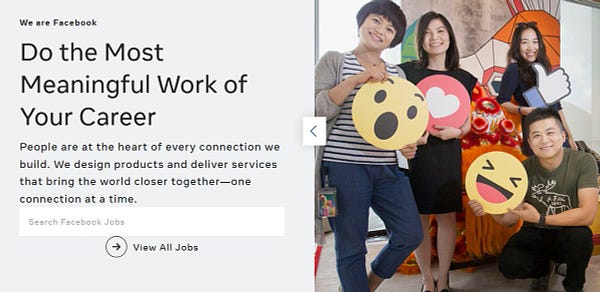
HONORABLE MENTION: COSTCO
I lied. 98 out of 100 were bad. I thought Costco’s career page was great mostly for one line, “be valued. promote from within.” This is pretty much all that’s on the page. There isn’t any fluff or promises of “meaningful work” or life transformation. I’ve studied Costco in-depth and these two lines are exactly what they are known for and follow through on in their culture.
To summarize, the key to writing a career page:
Don’t make bold claims, especially about people’s lives outside of work
Don’t promote an outdated mission that is too vague to mean anything
Say what you are great at; be specific
Say what you need help with
Describe who succeeds at the company and who doesn’t
Take all the spam, location tracking, and opt-ins off the page
Or simply, do the opposite of what every other company does
I share this not to call out all of these companies but I am genuinely curious why companies don’t put more effort into their career pages. A little honesty and effort into better writing might go a long way. Or at minimum why not embrace a little humor?
#2 Work Ethic Camp
Aeon published a fascinating article exploring the modern work ethic and a prison’s attempts to instill this attitude in its workers. It follows the story of Russell:
He was remanded to the Work Ethic Camp (WEC), a medium-security prison northwest of McCook, Nebraska, where he faced a three-year sentence on two counts of drug trafficking. Originally designated the ‘Incarceration Work Camp’, the name was changed to reflect the unique educational programming it offers. Those incarcerated there are parole-eligible only after successful completion of a programme that offers a chance to ‘re-enter their home communities from WEC with a practised routine work schedule, experience in teamwork, and a positive work ethic’.
But does an American really need to be taught the work ethic? One prisoner seems to think he didn’t need to be re-programmed:
‘It’s just as important to believe in work as it is to do it,’ said another person I spoke with, who was also incarcerated there. ‘It’s a jail, but it’s also a school,’ adding that he worried this might sound like an oxymoron. ‘Prisons give life lessons,’ he stressed. ‘And there’s nothin’ more important than learning to work.’
Russell wasn’t similarly convinced: ‘My perspective of jobs while I’ve been incarcerated is that it’s all pointless. They expect us to work and slave away for a petty amount of money … The worker’s mind isn’t much different from the criminal’s mind. They’re just different approaches to making money. I would know.’
The essay explores the idea that our modern work ethic seems to have become unpaired from any fundamental reason for existing and the fact that it undermines itself when there is a lack of good jobs.
It also ponders why America has taken such a different route than other countries in the last 50 years.
But it’s a common misconception that our comparatively long work hours are the result of a uniquely American belief system. Americans worked fewer hours than Europeans at mid-century. At that time, public opinion surveys showed that both groups espoused a belief in the value of hard work with equal intensity.
Today, Americans work many more hours – about eight hours more than Germans, and six hours more than the French, per week – and endorse the work ethic at higher levels, including low-income workers and the unemployed. Younger workers today, the ones often maligned as lazy and entitled, believe that ‘hard work is important to getting ahead’ more than predecessor generations. This correlation suggests that Americans are increasingly getting what we want: more work.
👉 The Full Essay Here
#3 Uneven Recovery
Indeed posts regular updates on the job market. It looks like Job postings have recovered to the levels of a year ago.
However, much of the recovery has been driven by small and medium metro areas likely driven by the fact that diseases spread much more in dense cities. It will be interesting to see if this, combined with people shifting to remote work leads to a decline in population in the biggest metros
#4 “Getting Rid of Your Boss”
A friend, Cam, is experimenting with sending people videos designed with useful tidbits for people’s audience. I’m always down for an experiment so here is Cam’s video titled “How to get rid of your boss.” I thought the approach was pretty funny (essentially, try to get your Boss a promotion). Let me know if you’ve ever tried something like this. He also run's a newsletter with similar unexpected strategies for life and work here.
Thanks for reading this week. Have any comments? Feel free to drop them below


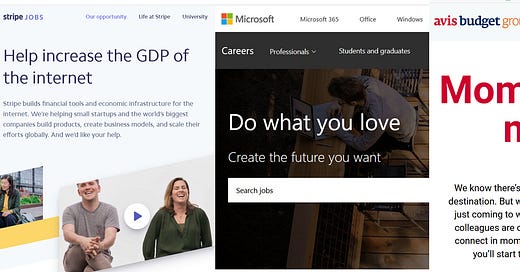






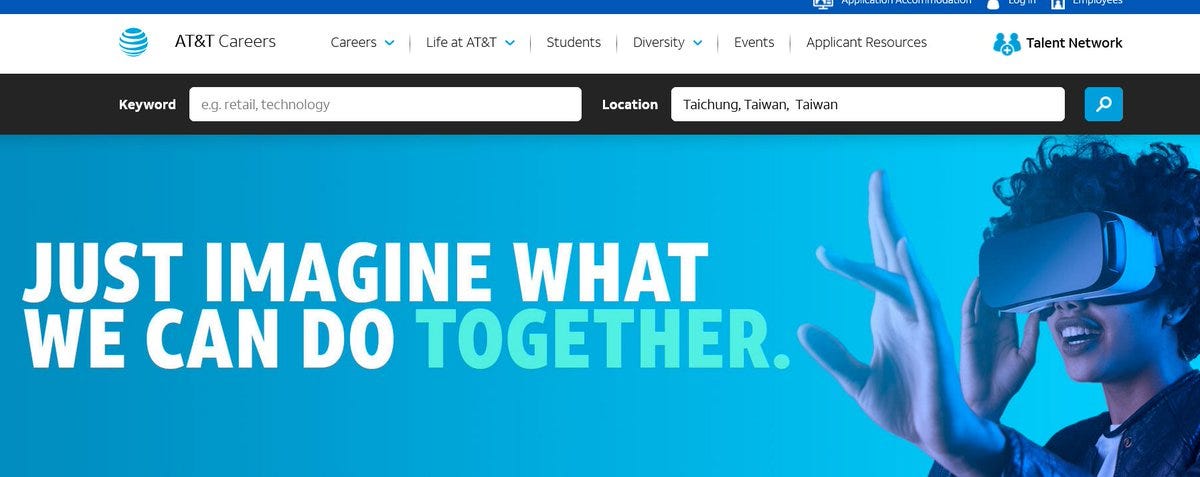







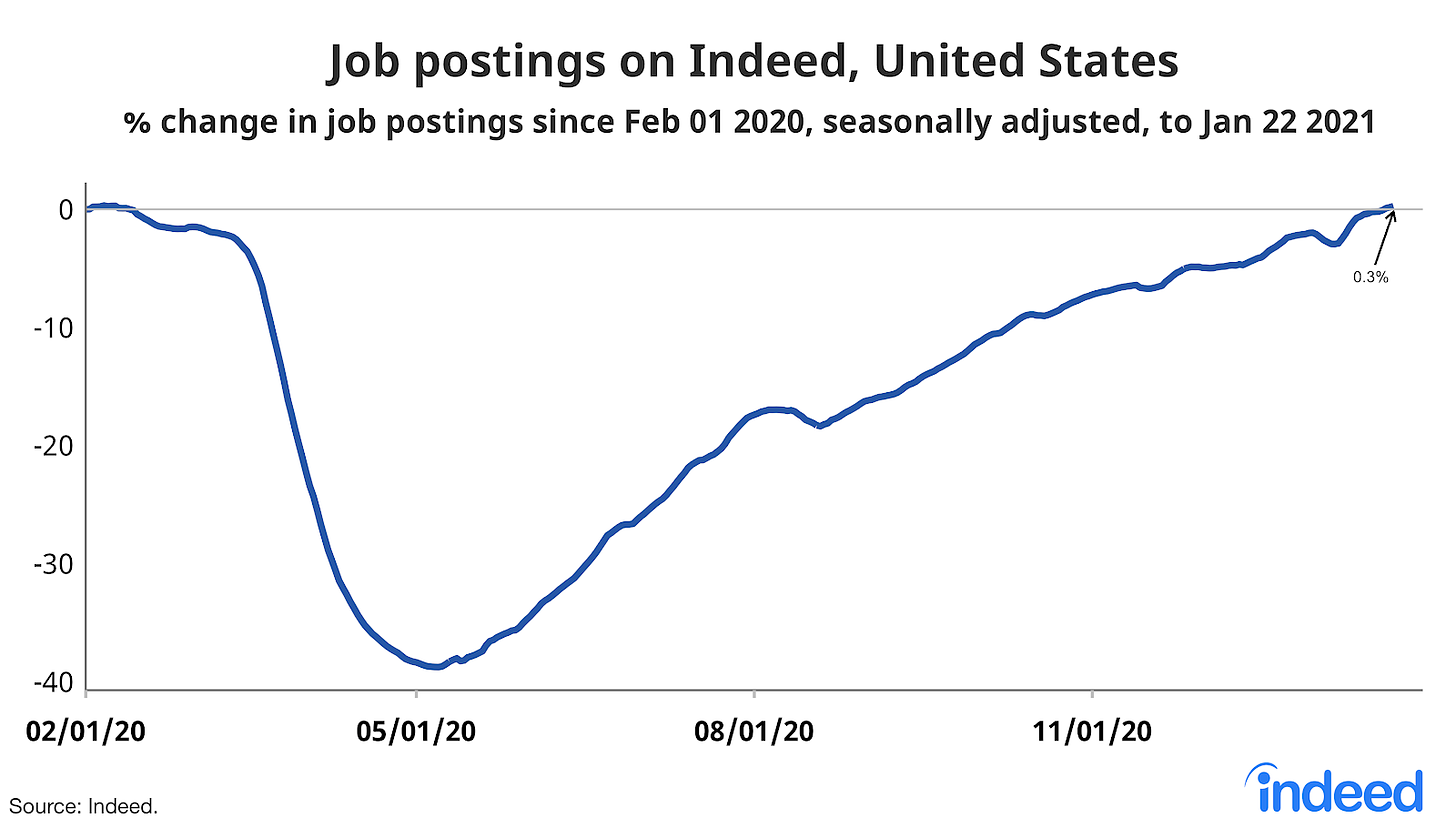
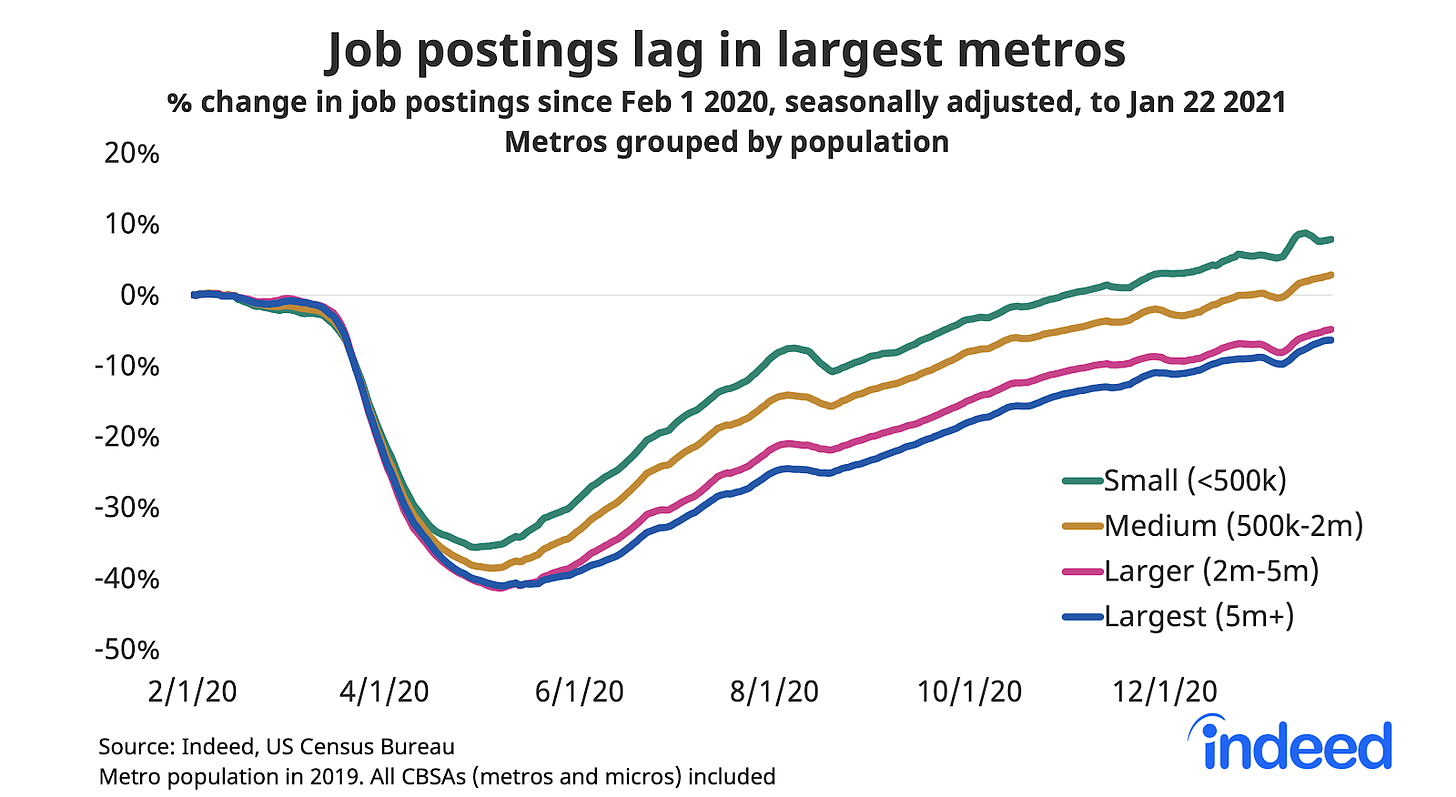
Wow - that really made me think! Great observation and writing.